Overview
This article serves as a compassionate guide to obtaining permanent residency (residencia permanente) in Spain, specifically designed for non-EU citizens. It recognizes the challenges you may face and provides a clear outline of your rights, requirements, and the application process. Importantly, it highlights the necessity of continuous legal residence for five years and the essential documentation you need to prepare.
You might be feeling overwhelmed by the complexities of this journey, but recent reforms have introduced a simplified application process. This guide aims to equip you with the knowledge and confidence to navigate the residency journey successfully. Remember, you are not alone in this process; many have walked this path before you, and with the right support, you can too.
As you embark on this important step towards your future in Spain, take a moment to reflect on the possibilities that await you. The journey may seem daunting, but with understanding and preparation, you can achieve your goal of permanent residency. Let's explore how you can make this dream a reality together.
Introduction
Navigating the path to permanent residency in Spain can often feel daunting, especially for non-EU citizens hoping to establish a long-term home in this vibrant country. It's important to acknowledge that the journey may seem overwhelming, but understanding the implications of 'residencia permanente' not only opens doors to a life filled with opportunities but also grants access to essential rights akin to those of Spanish citizens.
You may be wondering: what does it truly take to secure this coveted status, and how can you effectively overcome the hurdles that lie ahead? This guide aims to demystify the process, offering a step-by-step approach to achieving permanent residency in Spain while highlighting key insights and potential challenges along the way.
Remember, you're not alone in this journey, and with the right support, your dream of living in Spain can become a reality.
Understand Permanent Residency in Spain
Permanent status in Spain, referred to as 'residencia permanente,' provides non-EU citizens with the chance to live and work in the country indefinitely. This status provides rights similar to those of Spanish citizens, including:
- Access to public health services
- The ability to travel within the Schengen Area for up to 90 days within a 180-day period
It’s important to remember that to qualify, applicants must demonstrate five years of continuous legal residence under a valid permit.
Recent reforms have simplified the submission process for obtaining residencia permanente, aiming for a processing duration of roughly 3 to 6 months for permits. You may be feeling overwhelmed by the process, but rest assured that in 2025, it is expected that approximately 300,000 individuals will successfully . This reflects the government's dedication to improving migrant rights. Notably, those with residencia permanente enjoy significant rights, such as:
- The ability to work without restrictions
- Access to healthcare services
Immigration specialists stress the importance of detailed planning and understanding of residence rights, especially considering the forthcoming changes in immigration legislation effective May 20, 2025, which seek to streamline the residence application process and enhance overall accessibility for candidates. These modifications will incorporate new criteria for language course applicants, further easing the route to residencia permanente. Remember, you are not alone in this journey; seeking legal assistance can make a significant difference in navigating these changes.
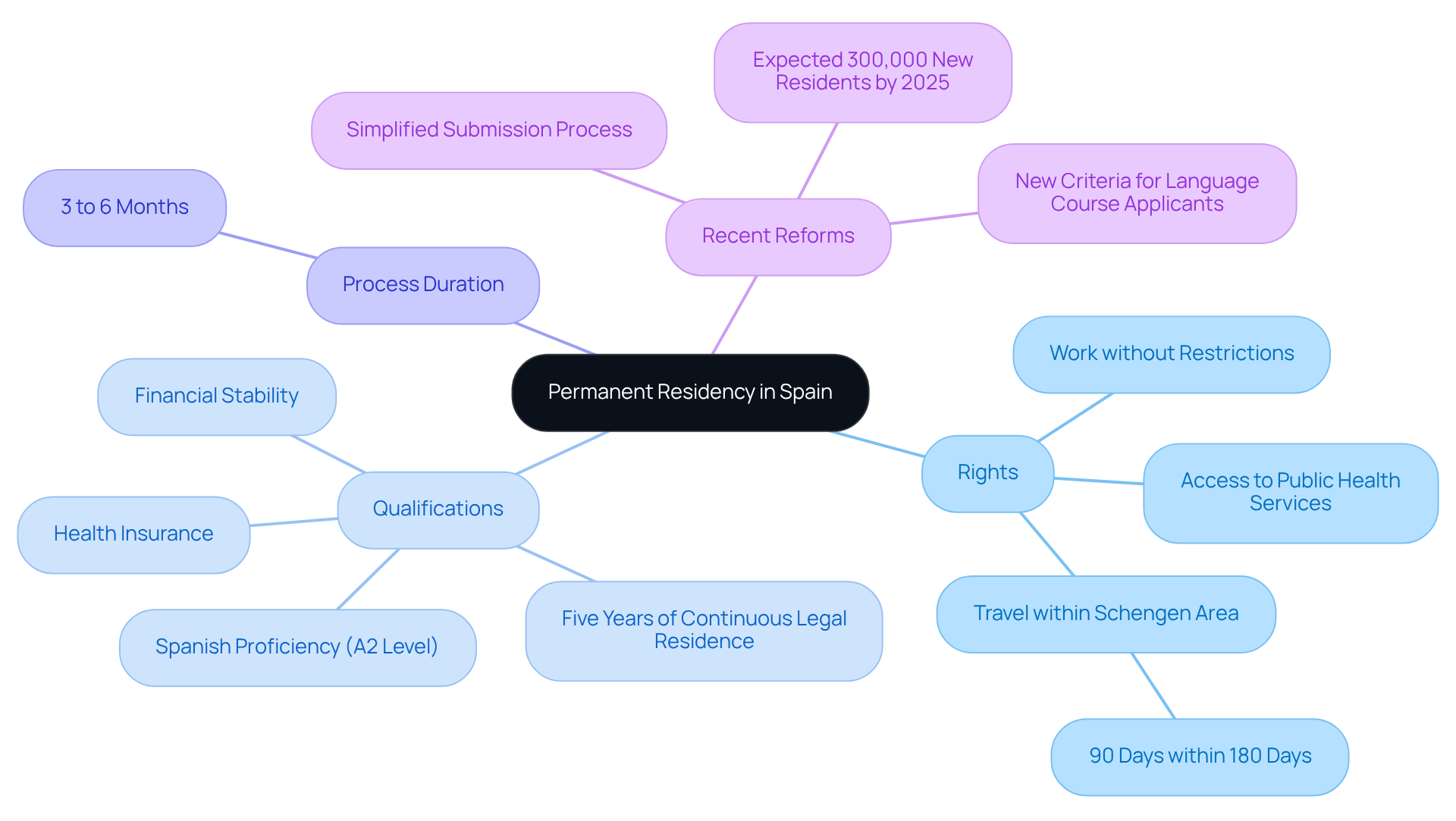
Explore Visa Options for Permanent Residency
To apply for residencia permanente in the country, it's essential to first possess a valid residence permit. You might be feeling overwhelmed by the options available, but understanding the most common visa types can help you navigate this process more easily:
- Work Visa: If you're employed in Spain, this visa allows you to live and work legally in the country. It’s important to meet specific employment criteria and secure a job offer from a Spanish employer to ensure a smooth application process.
- Family Reunification Visa: This option is available for family members of Spanish citizens or residents, making it easier for loved ones to reunite. Recent statistics show that family reunification visas have a high approval rate, especially for immediate family members, with processing times typically ranging from 4 to 6 months. Remember, incoming relatives must also obtain health insurance as part of the application process.
- Investor Visa: For those looking to make substantial investments in Spanish real estate or businesses, this visa provides a pathway to living in the country. The investment threshold is set at €500,000 in real estate, which not only grants the right to stay but also opens the door to possible citizenship after a specified duration.
- Second Chance Arraigo: If you're an asylum seeker, the new 'second chance' arraigo de segunda oportunidad offers another pathway to residencia permanente. This option allows individuals who have made authorized Social Security contributions to apply for a residence permit.
It's important to remember that thoroughly researching these options is crucial to selecting the best route for your circumstances. Immigration specialists emphasize the significance of understanding the specific criteria and paperwork required for each visa category to boost your chances of a successful submission. As immigration attorneys often point out, "Navigating the complexities of visa processes requires careful attention to detail and a clear understanding of the obligations involved." Seeking legal assistance can provide you with the support you need to make this journey smoother.
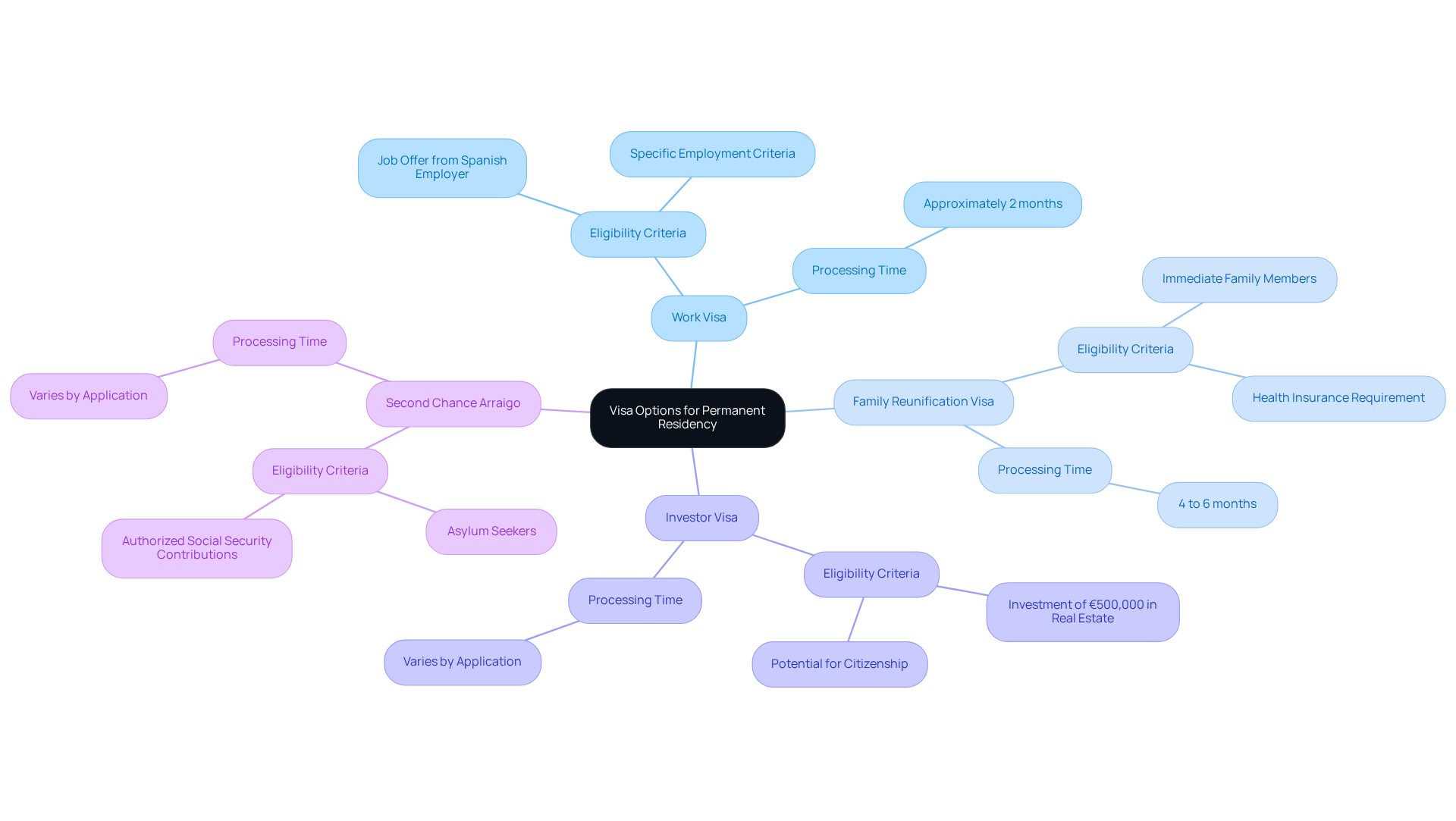
Review General Requirements for Application
Applying for residencia permanente in Spain can feel overwhelming, but understanding the key requirements can make the process smoother. Here are the essential steps you need to take:
- Proof of Continuous Residence: You’ll need to show that you have lived in Spain legally for five uninterrupted years. This is a significant milestone in your journey to achieving residencia permanente.
- Valid Residence Permit: It’s important to have a current and valid residence permit as part of your application.
- Evidence of Financial Stability: This includes documentation like employment contracts, recent bank statements, or proof of income from pensions or investments. It’s crucial to demonstrate that you can support yourself financially. For primary candidates of the Non-Lucrative Visa, the minimum income criterion is €28,800 annually, plus an additional €600 per month for each dependent.
- Health Insurance Coverage: Comprehensive health insurance that meets Spanish standards is a requirement for residency requests.
- Clean Criminal Record: You’ll also need a certificate confirming a clean criminal record from your home country.
Preparing these documents in advance is vital for a smooth submission process. You may be feeling anxious about meeting these requirements, but remember that showing and having sufficient health insurance are essential elements of a successful residencia permanente request. As Irene Marti Gispert, CEO at NIM immigration lawyers, wisely states, 'Financial stability is not just a requirement; it’s a foundation for your residencia permanente success.'
By gathering the necessary documentation early and ensuring compliance with these requirements, you can enhance your chances of a favorable outcome. Additionally, keep in mind that the enrollment procedure generally costs about €80 and takes roughly 3-6 months. Early preparation is key to navigating this journey with confidence.
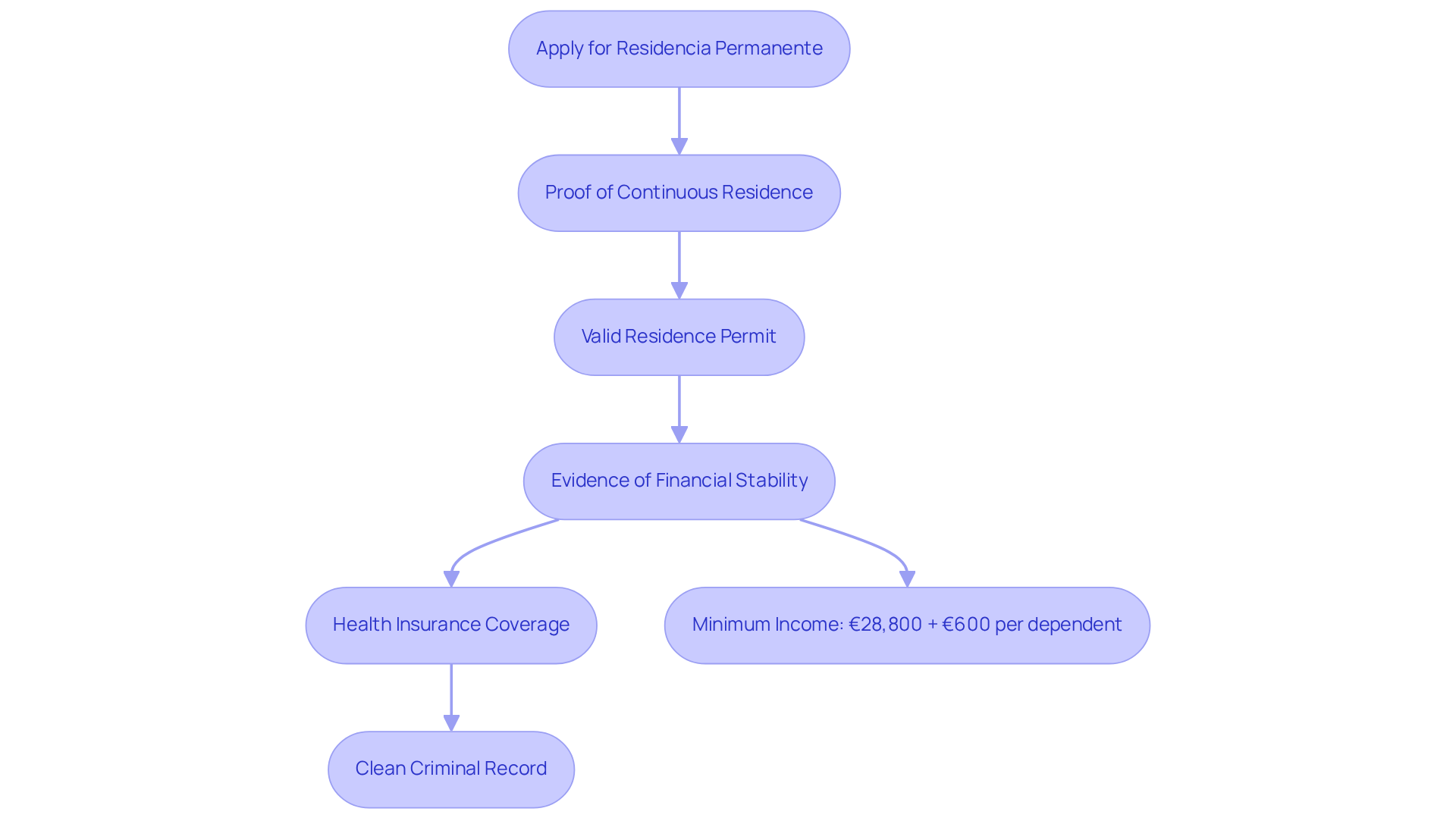
Follow Steps to Complete the Application Process
Navigating the application process for residencia permanente in Spain can feel overwhelming, but you’re not alone. Here are some essential steps to guide you through this important journey:
- Gather Required Documents: Start by compiling all necessary paperwork, such as proof of residence, evidence of financial stability, and valid health insurance coverage. Commonly required documents include bank statements, a completed form, and a criminal record certificate. If you’re applying for the Non-Lucrative Residence Visa, remember that you’ll need to demonstrate a minimum income of around €2,400 per month.
- Complete the Form: It’s important to acquire the official submission form from your local Spanish consulate or immigration office. Make sure that every section is filled out accurately to avoid any delays that could add to your stress.
- Submit Your Request: Once your form is complete, deliver your request along with the required documents to the appropriate authority. This could be a or a consulate, depending on where you are.
- Pay the Processing Fee: As of 2025, the processing fee for permanent settlement in Spain is approximately 80 euros. Be sure to pay this fee at the time of submission to prevent any processing issues that might arise.
- Attend an Interview (if necessary): You may be asked to attend an interview where you’ll have the opportunity to discuss your residency intentions and provide additional details about your application. Remember, this is a chance to share your story.
- Await Decision: After you’ve submitted everything, the processing period can vary based on the type of request. It’s essential to remain patient and keep an eye out for any updates regarding your status.
Following these steps carefully can significantly enhance your chances of a successful application for residencia permanente. Additionally, ensure that your health insurance covers medical costs in Spain, as this is a requirement for permits. It’s also wise to be aware of potential bureaucratic challenges during this process. If you find yourself feeling uncertain, consider reaching out to immigration consultants who can help you navigate these complexities with ease and confidence.
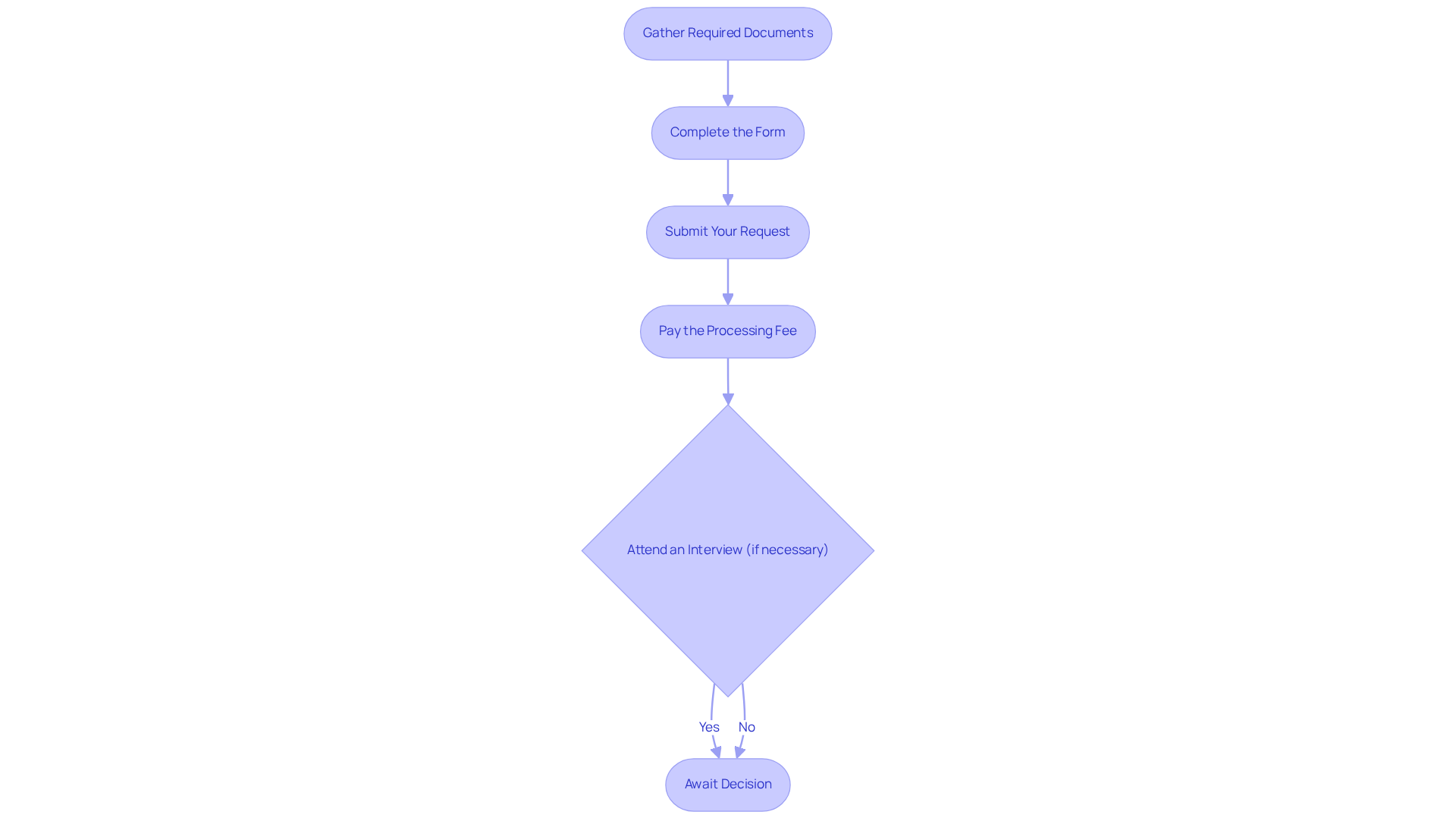
Troubleshoot Common Application Challenges
Navigating the residency application process in Spain can indeed be challenging, but you are not alone in this journey. Many applicants encounter hurdles, and understanding these can help you prepare effectively.
- Missing Documentation: One of the most common issues is missing paperwork. In fact, statistics show that in 2025, nearly 30% of residency applications faced delays or denials due to incomplete documentation. To avoid this, it’s essential to double-check your paperwork meticulously. Ensure all required documents are included and properly formatted—this small step can make a significant difference.
- Language Barriers: Language can feel like a significant hurdle during the immigration process. You might consider hiring a to help bridge communication gaps. Many applicants have successfully navigated this challenge by collaborating with professionals who understand both the legal terminology and the nuances of the Spanish language. Have you thought about how this could ease your experience?
- Long Processing Times: Patience is key, as processing times can vary widely. Regular follow-ups with the immigration office can keep your request on track and provide updates on its status. It’s important to remember that delays are common, and understanding this can help you manage your expectations.
- Request Denials: If your request is denied, it’s crucial to carefully review the reasons provided. Many applicants have successfully re-applied by addressing the specific issues cited in their denial letters, often with the assistance of legal counsel. Seeking professional guidance can greatly enhance your likelihood of success in future submissions. Have you considered reaching out for support?
By being proactive and prepared, you can effectively tackle these challenges and enhance your chances of a successful residency application. Remember, you have the strength and resources to navigate this process, and seeking help is a positive step forward.
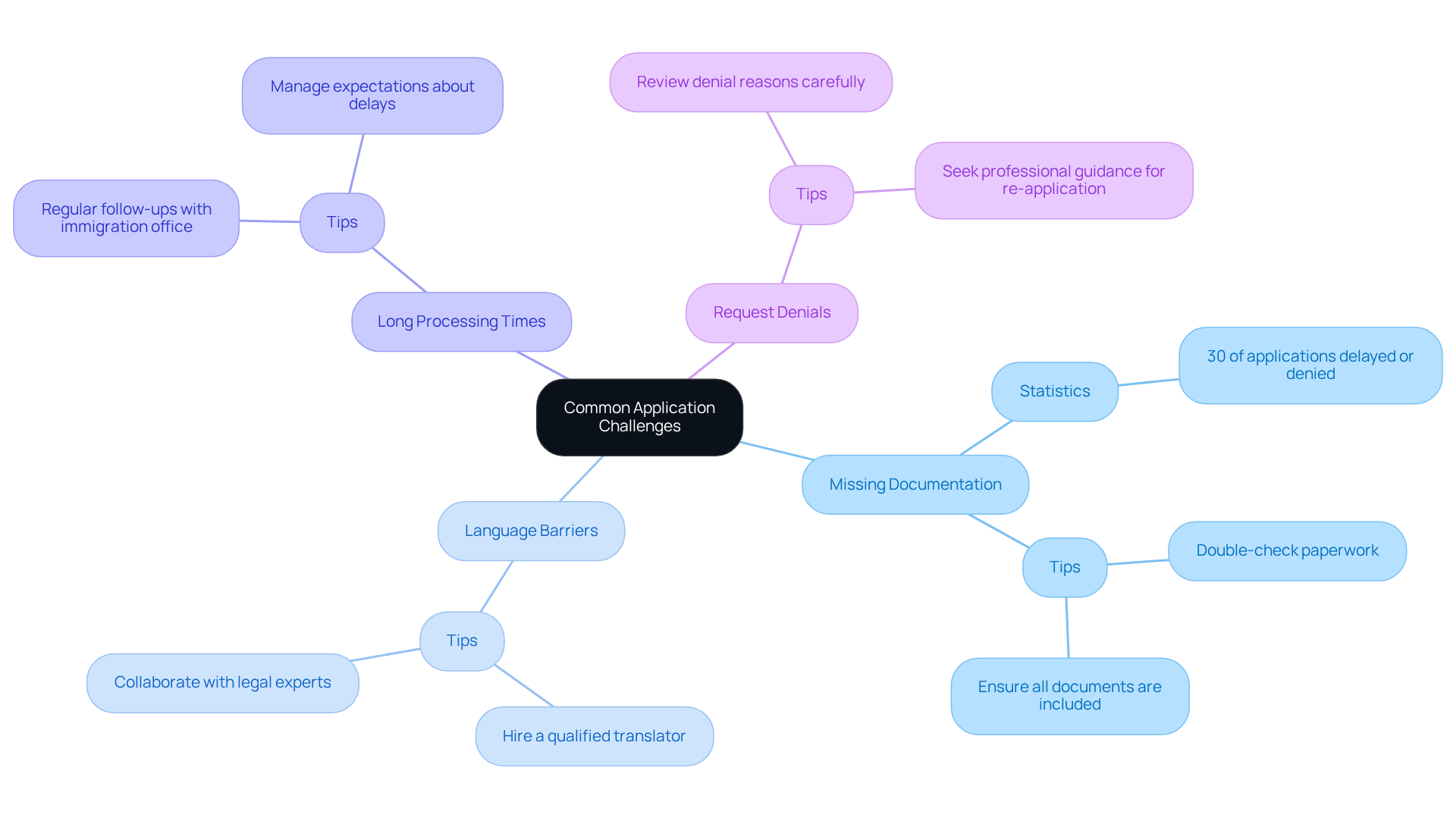
Conclusion
Achieving residencia permanente in Spain opens the door to a wealth of opportunities for non-EU citizens, allowing them to live, work, and access essential services in this vibrant country. You may find the journey complex, but it can be navigated successfully with a clear understanding of the requirements and the application process.
It's important to remember that continuous legal residence is crucial. You will need a valid residence permit and comprehensive documentation, such as proof of financial stability and health insurance. Familiarity with various visa options—like work, family reunification, and investor visas—will help you select the most appropriate path for your situation. Additionally, preparing for common challenges, such as missing documentation and language barriers, can significantly enhance your chances of a successful application.
As the landscape of immigration in Spain evolves, staying informed about upcoming reforms is essential. Seeking legal assistance can empower you on your journey to permanent residency. While the process may seem daunting, with careful planning and preparation, you can confidently navigate the complexities and ultimately secure your place in Spain. Embracing this opportunity not only enriches your personal life but also contributes to the cultural tapestry of Spain, making it a truly worthwhile endeavor.
Frequently Asked Questions
What is 'residencia permanente' in Spain?
'Residencia permanente' is a permanent residency status in Spain that allows non-EU citizens to live and work in the country indefinitely, providing rights similar to those of Spanish citizens.
What rights do holders of residencia permanente have?
Holders of residencia permanente have access to public health services, the ability to travel within the Schengen Area for up to 90 days within a 180-day period, and the right to work without restrictions.
What are the requirements to qualify for residencia permanente?
To qualify for residencia permanente, applicants must demonstrate five years of continuous legal residence under a valid permit.
How long does the application process for residencia permanente take?
The application process for residencia permanente typically takes about 3 to 6 months.
What changes are expected in immigration legislation in 2025?
Changes effective May 20, 2025, aim to streamline the residence application process and enhance accessibility for candidates, including new criteria for language course applicants.
What are the common visa options for applying for residencia permanente?
Common visa options include: - Work Visa: For individuals employed in Spain. - Family Reunification Visa: For family members of Spanish citizens or residents. - Investor Visa: For those making substantial investments in Spanish real estate or businesses. - Second Chance Arraigo: For asylum seekers who have made authorized Social Security contributions.
What is the investment threshold for the Investor Visa?
The investment threshold for the Investor Visa is set at €500,000 in real estate.
Why is it important to seek legal assistance during the application process?
Seeking legal assistance can help navigate the complexities of visa processes, ensure understanding of specific criteria and paperwork required, and ultimately boost the chances of a successful application.




